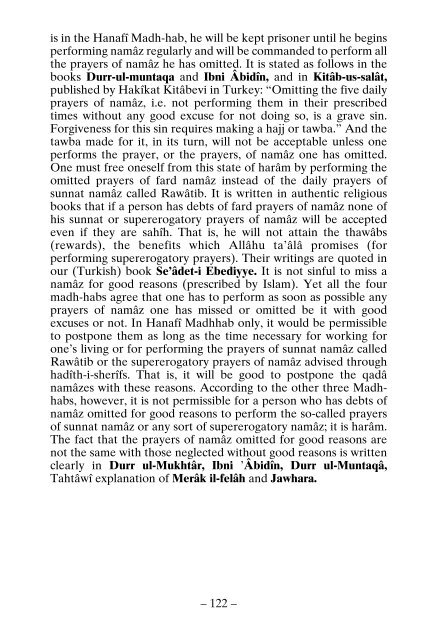Confessions Of A British Spy
Muhammad of Najd was the sort I had been looking for. For his scorn for the time’s scholars, his slighting even the (earliest) four Khalîfas, his having an independent view in understanding the Qur’ân and the Sunna were his most vulnerable points to hunt and obtain him. So different this conceited youngster was from that Ahmed Efendi who had taught me in Istanbul! That scholar, like his predecessors, was reminiscent of a mountain. No power would be able to move him. Whenever he mentioned the name of Abû Hanîfa, he would stand up, go and make an ablution. Whenever he meant to hold the book of Hadîth named he would, again, make an ablution. The Sunnîs trust this book very much. Muhammed of Najd, on the other hand, disdained Abû Hanîfa very much. He would say, “I know better than Abû Hanîfa did. In addition, according to him, half of the book of wrong.
Muhammad of Najd was the sort I had been looking for. For
his scorn for the time’s scholars, his slighting even the (earliest)
four Khalîfas, his having an independent view in understanding
the Qur’ân and the Sunna were his most vulnerable points to hunt
and obtain him. So different this conceited youngster was from
that Ahmed Efendi who had taught me in Istanbul! That scholar,
like his predecessors, was reminiscent of a mountain. No power
would be able to move him. Whenever he mentioned the name of
Abû Hanîfa, he would stand up, go and make an ablution.
Whenever he meant to hold the book of Hadîth named he would, again, make an ablution. The Sunnîs trust this book
very much.
Muhammed of Najd, on the other hand, disdained Abû Hanîfa
very much. He would say, “I know better than Abû Hanîfa did.
In addition, according to him, half of the book of wrong.
You also want an ePaper? Increase the reach of your titles
YUMPU automatically turns print PDFs into web optimized ePapers that Google loves.
is in the Hanafî Madh-hab, he will be kept prisoner until he begins<br />
performing namâz regularly and will be commanded to perform all<br />
the prayers of namâz he has omitted. It is stated as follows in the<br />
books Durr-ul-muntaqa and Ibni Âbidîn, and in Kitâb-us-salât,<br />
published by Hakîkat Kitâbevi in Turkey: “Omitting the five daily<br />
prayers of namâz, i.e. not performing them in their prescribed<br />
times without any good excuse for not doing so, is a grave sin.<br />
Forgiveness for this sin requires making a hajj or tawba.” And the<br />
tawba made for it, in its turn, will not be acceptable unless one<br />
performs the prayer, or the prayers, of namâz one has omitted.<br />
One must free oneself from this state of harâm by performing the<br />
omitted prayers of fard namâz instead of the daily prayers of<br />
sunnat namâz called Rawâtib. It is written in authentic religious<br />
books that if a person has debts of fard prayers of namâz none of<br />
his sunnat or supererogatory prayers of namâz will be accepted<br />
even if they are sahîh. That is, he will not attain the thawâbs<br />
(rewards), the benefits which Allâhu ta’âlâ promises (for<br />
performing supererogatory prayers). Their writings are quoted in<br />
our (Turkish) book Se’âdet-i Ebediyye. It is not sinful to miss a<br />
namâz for good reasons (prescribed by Islam). Yet all the four<br />
madh-habs agree that one has to perform as soon as possible any<br />
prayers of namâz one has missed or omitted be it with good<br />
excuses or not. In Hanafî Madhhab only, it would be permissible<br />
to postpone them as long as the time necessary for working for<br />
one’s living or for performing the prayers of sunnat namâz called<br />
Rawâtib or the supererogatory prayers of namâz advised through<br />
hadîth-i-sherîfs. That is, it will be good to postpone the qadâ<br />
namâzes with these reasons. According to the other three Madhhabs,<br />
however, it is not permissible for a person who has debts of<br />
namâz omitted for good reasons to perform the so-called prayers<br />
of sunnat namâz or any sort of supererogatory namâz; it is harâm.<br />
The fact that the prayers of namâz omitted for good reasons are<br />
not the same with those neglected without good reasons is written<br />
clearly in Durr ul-Mukhtâr, Ibni ’Âbidîn, Durr ul-Muntaqâ,<br />
Tahtâwî explanation of Merâk il-felâh and Jawhara.<br />
– 122 –


